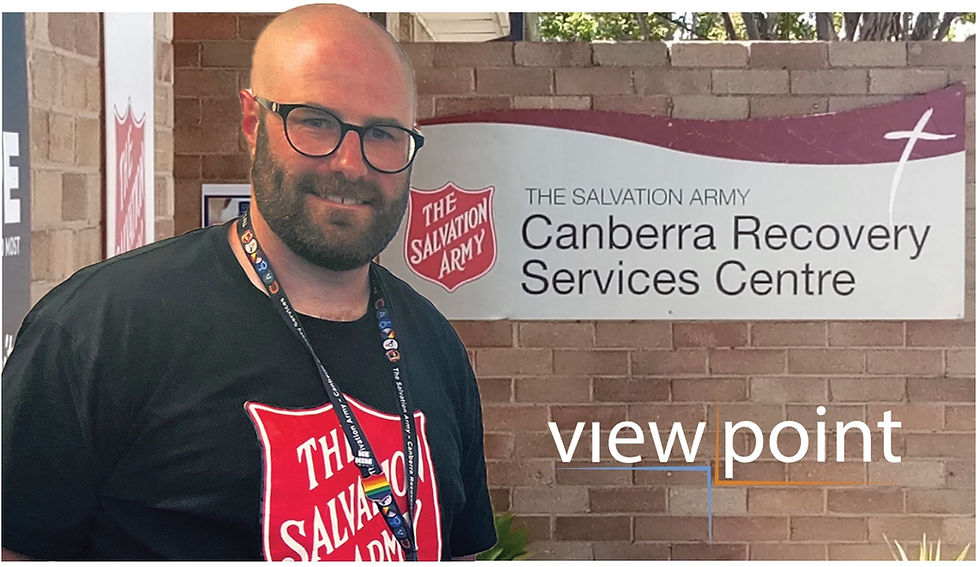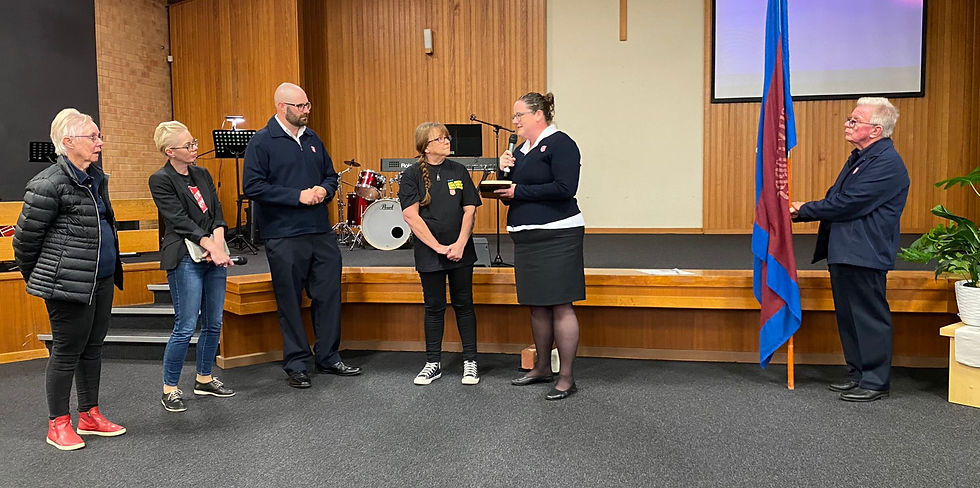Jesus is still in our rehabs
- Aug 13, 2025
- 4 min read
Updated: Aug 14, 2025

CAPTAIN MITCHELL STEVENS serves as the Mission and Ministry Coordinator at Canberra Recovery Services Centre, which specialises in Alcohol and Other Drugs (AOD) rehab. In this Viewpoint for Salvos Online, he addresses the myth that Salvation Army Recovery Services has removed faith from its operations.
In recent years, a common phrase has grated on my spirit because, to me, it rings untrue and unbiblical: “AOD services have taken Jesus out of our recovery services.”
Biblically, we cannot remove God from anywhere, as all things were created by him and for him. Although we no longer use the 12-step model and do not teach about Jesus in our therapeutic groups, there is ample opportunity to deliver a spiritually open program that develops faith pathways, allowing people to come to faith through our recovery programs.
The Social Mission Spirituality Framework encourages all staff to be mindful of the importance of spirituality and to refer participants to appropriate counsel. We must remember that it is not the professional workers’ prerogative to create faith pathways; it is the officers, chaplains and corps that need to be intentional in creating these spaces. We need our professional staff to do their amazing work so we can do ours.
Part of the new model of care is the Exploring Spirituality group that I and other chaplains, officers and volunteers run. This program has been running for many years and is now being delivered at local corps where Day Program services are available, such as Canberra City in the ACT and Maroubra in Sydney’s eastern beaches.
Over the past three months, five of our Day Program participants at Canberra City Salvos have begun attending Recovery Church, and four of them have started the Alpha course.
READ MORE: Putting the Salvation back into our Army
Those staying at the rehab are always welcome to attend church, with our corps bus collecting people each week. It is not compulsory, but we gently invite them every week, just as we encourage them to join a 12-Step program of their choice.
Everyone is in recovery! This is one of our key pillars at Canberra City Salvos Recovery Church.
I don’t have a background in substance misuse, but I do struggle with depression. My personal recovery has been anchored by the principles we follow at Recovery Church. We say the opposite of addiction is connection, connection to one another and to God. Everyone is in recovery because no one has it all together. As Christians, we believe we all fall short of God’s glory (Romans 3:23).
I have had the privilege of ministering in our recovery community as the Corps Officer of Canberra City Salvos (2019-2022), Ministry and Support Manager at Canberra Recovery Services (2023-present), and also supporting divisionally where Alcohol and Drug Services and corps work together.

I have witnessed the shift in the model of care and the inception of a Day Program facilitated at the corps. Having worked at Bridge House in Perth, served at 614 Vancouver for three years and in my current appointment, I can confidently say that I love ministering alongside people in recovery. Our culture is that we are ‘doing’ recovery with people, not just ministering to people in recovery.
One reason I believe there has been such misunderstanding about how the new model of care aligns with our Christian mission is the change in method. Changing the method means those who aren’t ‘in the thick of it’ might find it harder to understand than those who are directly involved.
When we first arrived at Canberra City Salvos as Corps Officers, the rehab would bring three 12-seater buses to church because it was mandatory. We live in a different era, and unless we want to fully fund our services – which we cannot – we shouldn’t expect someone attending our AOD service to have to come to church. We still encourage it and make it as easy as possible for them to attend.
“It is a great honour for The Salvation Army to minister with people at such a vulnerable time in their lives.”
What has been noticeable since the change is that those who do attend do so because they are open and willing. It is much easier to work with people who are open and willing than with those who may be hardened because they don’t want to be there.
It is a great honour for The Salvation Army to minister with people at such a vulnerable time in their lives. I believe we should do our best to model what we hope for them in their lives. We are all in recovery, and if someone has put their hand up and said, “I need help with my addictions,” we should be just as quick to put our hand up and say we need help too.
Leading someone on a recovery journey we haven’t undertaken is challenging. Whether you're involved in recovery ministry or not, perhaps it’s time to raise your hand and begin your own recovery journey. From my personal experience, my life now resembles the ‘abundant life’ Jesus promised since I started the recovery process and asked God and others for help.






